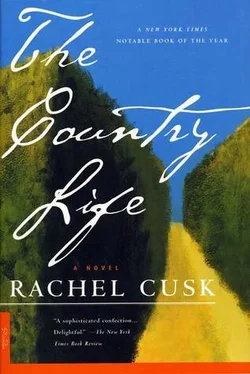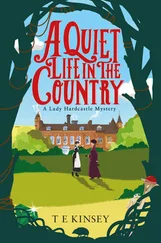‘Why are you so keen to know what I think?’ I said, heaving him over a delta of ruts. Seeing that I was not to be so easily seduced, he had given up his gamin gazing and was now looking straight ahead. I was struck, as I pushed the chair through the dark, lovely glade stilled by the profuse calm of summer, by the odd realization that this was exactly how, during those few days in London, I had imagined my life in the country would be. Or was I merely recognizing, in the paradisal picture around me, a kind of mental ideal which, based on what I knew while still in London of the place to which I was going, might have constituted such an image? In other words, had I really imagined it like this, or was it just that I had happened on an enclave of time and place so logical in its felicity that it transcended its actual existence to become a kind of paradigm; a vision which, being perfect — and corresponding too to the few things I had known about my future situation — took on the texture of memory, wherein all the flaws and stains of lived events are purged? I have often experienced this feeling of doubt when encountering extreme beauty or happiness.
Martin had not replied to my question, and so I continued: ‘After all, it’s not as if you know me very well. Why should my opinion matter to you?’
‘I don’t know,’ said Martin sulkily. ‘I think it’s obvious why. I don’t exactly get out much.’
I felt chastened by this remark. I had humiliated him by attributing to prurience or mischief what was in fact a hunger for novelty. Trapped as he was, both now and for the foreseeable future, in the same stale set of circumstances, it was natural that a newcomer should exert more than the usual interest.
‘That’s true,’ I said, keen to made amends. ‘But it doesn’t alter the fact that I haven’t been here long enough to have any view which I could be sure wouldn’t change over the next twenty-four hours.’
I was really quite tired out by this point. We had reached a kind of clearing, at the centre of which was a pond. Beside it stood a small, sagging tree — a willow — whose lachrymose branches drooped into the pool below, giving it the appearance of a vast melting candle. The stagnant water was thickly covered by a bright green blanket of algae, above which all manner of creatures circulated in a busy airborne community.
‘Shall we stop here for a minute?’
‘If you want,’ said Martin uncharitably.
I wheeled him round to face the pond and let go of the handles of his chair, intending to sit down on the grass beside him. To my horror, however, his chair began abruptly to roll forwards towards the swampy water. I cried out, lunging for the handles while Martin sat, inert, his small body jolting as the wheels trundled down the slope. Just in time, I managed to grip the back of the leather seat, and dragged the chair back from the brink and up the slope, my chest heaving with panic.
‘Oh, my God!’ I panted. ‘Are you all right?’
‘Yes,’ said Martin coolly. ‘You should always put the brake on before you let go.’
There was a slightly menacing edge to his voice. I remembered having seen him put on the brake himself at the top of the stairs, and suspected, maliciously, I admit, that he had neglected to save himself on this occasion to upset me.
‘I’m terribly sorry,’ I said. ‘Are you sure you’re all right?’
I wondered if he would tell Pamela what had happened, and began to think immediately about how I would be able to broach this subject and gain the promise of his discretion before we returned to the house.
‘I can’t swim,’ said Martin. ‘I’d have drowned.’
‘There’s no need to be like that,’ I snapped. ‘Anyway, I wouldn’t have let you drown. I’d have jumped in and saved you.’
‘How?’ said Martin. ‘I’d have sunk like a stone beneath all that muck. You wouldn’t have been able to find me.’
‘If what you require,’ I said imperiously, ‘is my assurance that I would have paid with my life to save your own, then you have it. We would have died together.’
‘My,’ said Martin. ‘How romantic.’
‘Quite,’ said I. ‘So if you would be so kind as to accept my apologies, then I should be grateful to hear no more about it.’
‘I’m sure you would,’ Martin replied, eyes aglint. ‘I think my mother might be interested, though.’
‘That,’ I said firmly, although my heart quavered, ‘is up to you.’ I applied the brake to his chair and sat down in the shade beside him. ‘Obviously I would prefer it if you didn’t mention it to her.’
‘Perhaps we might strike a bargain,’ said Martin, after a pause.
‘Really! And what might that be?’ I knew filli well what the evil dwarf meant.
‘You know,’ said Martin, folding his arms across his chest.
‘I hope,’ I replied, ‘that you are not trying to blackmail me into giving dubious and ill-formed opinions of your family in return for not telling tales. If you intend to ask me what I think of you under such circumstances, then you will hear nothing flattering. It’s up to you.’
Various insects had come to plague me as I sat on the grass, and I swatted at them irritably with my hands. I wished that we had moved ourselves elsewhere, away from the gloomy prospect of the pond, and the near accident to which it testified.
‘What makes you think that I care what you think of me?’ said Martin presently.
‘I asked you the same question not long ago,’ I replied. ‘Your answer, such as it was, suggested that you did care. If you deny it, then I will call your bluff. As I said before, it’s up to you.’
‘As a matter of fact, I don’t care what you or anyone else thinks of me. It doesn’t make any difference. I was only joking, anyway.’
A look of pain collected on Martin’s face, like something dense and murky at the bottom of a drain. Seeing the poor, naked savagery of his features, I was moved to feel pity for him. He made a sorry opponent; and I wondered at myself, that I should have been so unkind to him.
‘Shall we carry on?’ I said then, standing up. I had an awareness of time passing, wasted, untouched. It seemed imperative to me that we continue with our walk.
‘All right,’ conceded Martin grudgingly. ‘Although that was mean, what you just said.’
‘I withdraw it,’ I said magnanimously.
‘Oh, shut up,’ muttered Martin, as I wheeled him in a half circle and headed back towards the path. ‘You’re getting on my nerves. Turn right here.’
We emerged from the wood and before long arrived at a wall, which formed one end of an enclosure. The wall was about six feet high and several yards across, and, being built of apparently very old red brick, over the top of which spilled a froth of vines and flowers of various types, was extremely picturesque. At its centre was a black wrought-iron gate, through which I could make out some form of horticultural splendour within.
‘What’s this?’ I said.
‘This,’ said Martin, leaning forward in his chair to open the latch, ‘is the Elizabethan Rose Garden.’
Having left behind the wood, we were once more exposed to the sun; which, it being now late morning, was astonishingly fierce. I found — and indeed have always found — that the heat exerted a peculiar effect on me. Sunshine can, of course, be very enjoyable, but when it becomes excessively strong, as now it was, I find that I lose sense of myself quite dramatically. I do not mean ‘lose my senses’, in other words go mad; rather, I am describing a certain loss or interruption of frequency brought about by the dominating presence of an external force. Heavy rain, I find, has precisely the opposite effect; meaning that it enlarges consciousness by waterlogging the other senses. The sun, however, has in my view a blanching, shrivelling influence upon thought; or rather, it seems to make everything the same, and thus melts the boundaries of self.
Читать дальше












